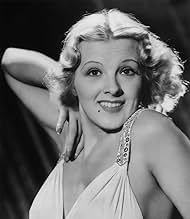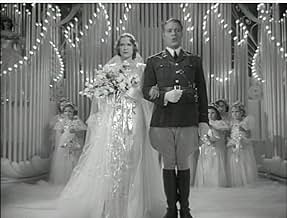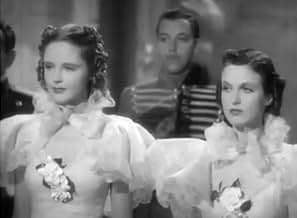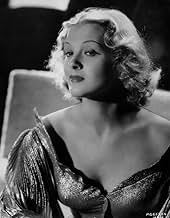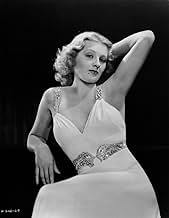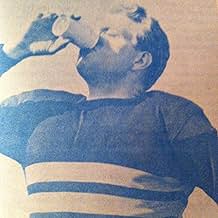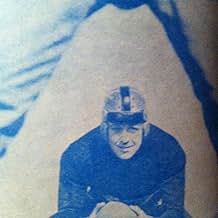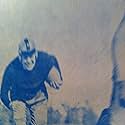अपनी भाषा में प्लॉट जोड़ेंWest Point cadet Dick Thorpe falls in love with a girl, who turns out to be a princess from an European kingdom.West Point cadet Dick Thorpe falls in love with a girl, who turns out to be a princess from an European kingdom.West Point cadet Dick Thorpe falls in love with a girl, who turns out to be a princess from an European kingdom.
- पुरस्कार
- कुल 1 जीत
Carol Adams
- Dancer
- (बिना क्रेडिट के)
Kay Aldridge
- Lady in Waiting
- (बिना क्रेडिट के)
फ़ीचर्ड समीक्षाएं
Eleanor Powell stars with Nelson Eddy, Ray Bolger, Edna May Oliver, and Frank Morgan in "Rosalie" from 1937.
The original music by Romberg and Gershwin was scrapped, and a new score was written by Cole Porter, which is very nice with the title song and "In the Still of the Night" the major songs that come out of it.
The plot is nothing unusual. A Princess (Powell) comes to America, where she hides her identity. She falls for a football playing cadet Dick Thorpe (Nelson Eddy, probably 15 years too old). Then she has to return to her country, Romanza, where she is betrothed to another. Dick follows her there along with his friend Bill (Bolger) whose girlfriend has dumped him.
I have to say that for me, this was Nelson Eddy's best singing - he showed more of his higher range and also demonstrated the ability to sing a high tessitura - I'm not trying to be a snob, that just means that even if music is consistently high, he can sing it. Not everyone can. This movie really made me wonder if there might have been a heldentenor lurking there someplace. Acting-wise he was pretty wooden. I never cared, not with that voice.
Eleanor Powell was delightful, both in her acting and great dancing.
Edna May Oliver is the domineering queen and Morgan is the bumbling King. Truthfully I really only was interested in the singing and dancing. And there was plenty of it, and some amazing sets.
The original music by Romberg and Gershwin was scrapped, and a new score was written by Cole Porter, which is very nice with the title song and "In the Still of the Night" the major songs that come out of it.
The plot is nothing unusual. A Princess (Powell) comes to America, where she hides her identity. She falls for a football playing cadet Dick Thorpe (Nelson Eddy, probably 15 years too old). Then she has to return to her country, Romanza, where she is betrothed to another. Dick follows her there along with his friend Bill (Bolger) whose girlfriend has dumped him.
I have to say that for me, this was Nelson Eddy's best singing - he showed more of his higher range and also demonstrated the ability to sing a high tessitura - I'm not trying to be a snob, that just means that even if music is consistently high, he can sing it. Not everyone can. This movie really made me wonder if there might have been a heldentenor lurking there someplace. Acting-wise he was pretty wooden. I never cared, not with that voice.
Eleanor Powell was delightful, both in her acting and great dancing.
Edna May Oliver is the domineering queen and Morgan is the bumbling King. Truthfully I really only was interested in the singing and dancing. And there was plenty of it, and some amazing sets.
Fans of Eleanor Powell will wonder how she detoured into this Jeanette MacDonald/Nelson Eddy overblown costume piece -- and in the role of Jeanette MacDonald no less! Whereas delicate Jeanette would have floated through this pageant with an air of fluttering dignity, pants-wearing Ellie delivers too much punch for a princess. She barks most of her lines and unfortunately comes off as a bitch. A more delicate actress would have softened the barrage of "womanly" insults laid on Nelson Eddy and we would know this meant she was smitten. But with the confidant and athletic Powell delivering the insults you really start to wonder if wooden Eddy is a masochist or just extremely submissive. It's an electric energy that cost Powell her spotlight, and didn't fit with MGM's idea of what a feminine leading lady should be.
Those who are fascinated by Ellie's unusual (at least on film) gender-play will be thrilled to see her "go all the way" and dress as a man to sneak into a military academy where she leads the cadets in a marching drill in front of a phallic war memorial. While Powell is hardly mannish (and here with Jeanette's wardrobe and make-up budget she never looked prettier) the production plays with her "masculinity" and dresses her in all extremes of buttoned-downed marching band jackets and crisp uniforms, interspersed with overly feminine gowns with frou-frou puffy sleeves and Jeanette's corkscrew curls. It's an inconsistent and mostly unsuccessful gender dichotomy -- especially when compared to her smart wardrobe play and winning charisma in the Broadway Melody films.
Her tap numbers are too few and too short -- a Pieroette "ballet" on giant drums is an weird jumble of inconsistent imagery, and a brief scene with Ray Bolger makes you wish they'd shared a competitive dance of lightning legwork rather than the time-wasting dialog in the script. Other supporting players are also underused: as the Queen Edna May Oliver appears briefly in a tiered nightgown that exaggerates her Olive Oil frame, and Frank Morgan does his best to keep the banter rolling as a befuddled monarch with a ventriloquist dummy, but there isn't enough comedy here to entertain. A sudden accidental revolution in the tiny Balkan monarchy has potential, but is dropped just as quickly. Even the production numbers are too short, following the pattern of the other MacDonald/Eddy films where actual choreography and musical style are ignored for lots and lots of extras arranged in expensive costumes and plenty of operetta bombast from Eddy.
Other than seeing Eleanor Powell in one of her few starring roles this is a forgettable film that shows no one to advantage, except possibly MGM's costume department. I can see how this was originally a vehicle for Marion Davies because the sets are jaw-droppingly huge.
Those who are fascinated by Ellie's unusual (at least on film) gender-play will be thrilled to see her "go all the way" and dress as a man to sneak into a military academy where she leads the cadets in a marching drill in front of a phallic war memorial. While Powell is hardly mannish (and here with Jeanette's wardrobe and make-up budget she never looked prettier) the production plays with her "masculinity" and dresses her in all extremes of buttoned-downed marching band jackets and crisp uniforms, interspersed with overly feminine gowns with frou-frou puffy sleeves and Jeanette's corkscrew curls. It's an inconsistent and mostly unsuccessful gender dichotomy -- especially when compared to her smart wardrobe play and winning charisma in the Broadway Melody films.
Her tap numbers are too few and too short -- a Pieroette "ballet" on giant drums is an weird jumble of inconsistent imagery, and a brief scene with Ray Bolger makes you wish they'd shared a competitive dance of lightning legwork rather than the time-wasting dialog in the script. Other supporting players are also underused: as the Queen Edna May Oliver appears briefly in a tiered nightgown that exaggerates her Olive Oil frame, and Frank Morgan does his best to keep the banter rolling as a befuddled monarch with a ventriloquist dummy, but there isn't enough comedy here to entertain. A sudden accidental revolution in the tiny Balkan monarchy has potential, but is dropped just as quickly. Even the production numbers are too short, following the pattern of the other MacDonald/Eddy films where actual choreography and musical style are ignored for lots and lots of extras arranged in expensive costumes and plenty of operetta bombast from Eddy.
Other than seeing Eleanor Powell in one of her few starring roles this is a forgettable film that shows no one to advantage, except possibly MGM's costume department. I can see how this was originally a vehicle for Marion Davies because the sets are jaw-droppingly huge.
The film has two Cole Porter songs -- "Rosalie" and "In the Still of the Night." For several bars of the latter, we see the back of Nelson Eddy as he sings to the back of Eleanor Powell. This daring shot is superb, because we can feel the effect of the song on both. Eddy is stiff, except when he sings. That stiffness is partly in the role as West Point cadet, but it's mostly Nelson. Powell has a great production number in her native Romanza, to which the unsuspecting Eddy has pursued her. Powell's best moments, though, occur as she commands a crack West Point drill team to the strains of "The Stars and Stripes Forever." The Souza march changes from 4/4 to waltz time for a Powell solo. The drill is an imaginative sequence that takes advantage of Powell's incredible skills. After all these years, you still say "Wow!" Frank Morgan is endearing as a king with an eye for the girls, while Edna May Oliver is completely convincing as his forever-angry wife. A couple of good moments occur when Morgan's puppet insults the Queen, speaking, as it were, for its puppeteer. Ray Bolger is completely wasted as Eddy's friend and Billy Gilbert's scenes, in which he sneezes over all bystanders, should have tasted the cutting room floor. But for its several great moments, this one is worth watching.
Take a major studio studio (MGM) celebrated for its musicals. Take a top director (Woody Van Dyke) known for his breezy direction of films like THE THIN MAN, SAN FRANCISCO and NAUGHTY MARIETTA, among many others. Take a handsome singing star (Nelson Eddy) who was the studio's biggest matinee idol at the time, getting more fan mail than Clark Gable. Take a charming young tap-dancing star (Eleanor Powell). Take a score by Cole Porter written especially for the picture, including `In the Still of the Night.' Add some popular supporting actors like Frank Morgan, Ray Bolger, and Edna May Oliver, and, for those few who find a professional sneezer amusing, Billy Gilbert.
Take all these elements, spend a small fortune on sets and costumes, and turn out a picture which is among the worst ever made. It's inexplicable. The full-throated Eddy has been turned into a crooner, playing the world's oldest (36) West Point Cadet. Powell's dancing is sprightly but the big centerpiece number, danced on a series of huge drums, can only be called bizarre, Poor Frank Morgan is forced to do most of his performing with a ventriloquist's dummy. There are one or two cute scenes---Powell and Eddy obviously like each other---but mainly this picture is simply awful. What a waste.
Take all these elements, spend a small fortune on sets and costumes, and turn out a picture which is among the worst ever made. It's inexplicable. The full-throated Eddy has been turned into a crooner, playing the world's oldest (36) West Point Cadet. Powell's dancing is sprightly but the big centerpiece number, danced on a series of huge drums, can only be called bizarre, Poor Frank Morgan is forced to do most of his performing with a ventriloquist's dummy. There are one or two cute scenes---Powell and Eddy obviously like each other---but mainly this picture is simply awful. What a waste.
5B24
Writing comments about a movie like this one is difficult. The plot and dialogue are atrocious, but the score and visuals are first rate. So one splits the difference and gives it a "5." As some of the few comments thus far have implied, it is a formulaic comedy with loads of prominent character actors of the time reprising roles already played in other movies and on the radio. Audiences in 1937 were for the most part captive to that sort of thing. Diversity of tastes like that of today just did not exist, and everyone going to the movies in small-town America was inclined to go along with the gag mainly because it was literally the only show in town.
When as a lad I paid my 9 cents admission at the box office, I knew I was going to sit through anything they threw at me, including the newsreel at the beginning, the same old cartoons, a dumb serial episode with someone falling off a moving train at the end -- to be continued -- and a main feature in black-and-white that depended more on stock characters and situations than on anything new or scandalous.
Now I watch these same features on Turner Classic Movies with moody nostalgia and total suspension of disbelief. So what if Nelson Eddy at nearly 40 was playing a cadet of half that age? And what about my now knowing that his off-screen person was 180 degrees off the roles he played? His singing is still mesmerizing, an operetta voice the likes of which disappeared ages ago -- indeed a relic of the Nineteenth Century. Even an uncharacteristically inferior Porter tune like "Rosalie" gets a high-class treatment.
Sure, there are better musicals from the 30's, but this one is a piece of history as well as a minor work of art.
When as a lad I paid my 9 cents admission at the box office, I knew I was going to sit through anything they threw at me, including the newsreel at the beginning, the same old cartoons, a dumb serial episode with someone falling off a moving train at the end -- to be continued -- and a main feature in black-and-white that depended more on stock characters and situations than on anything new or scandalous.
Now I watch these same features on Turner Classic Movies with moody nostalgia and total suspension of disbelief. So what if Nelson Eddy at nearly 40 was playing a cadet of half that age? And what about my now knowing that his off-screen person was 180 degrees off the roles he played? His singing is still mesmerizing, an operetta voice the likes of which disappeared ages ago -- indeed a relic of the Nineteenth Century. Even an uncharacteristically inferior Porter tune like "Rosalie" gets a high-class treatment.
Sure, there are better musicals from the 30's, but this one is a piece of history as well as a minor work of art.
क्या आपको पता है
- ट्रिवियाThe singing voice of Eleanor Powell was dubbed by Marjorie Lane (uncredited).
- गूफ़During the 'drum dance' sequence there are three rows of huge drums all sounding together. The drum sticks on the front row are synchronized so that they all hit the drum at the same time. The drum sticks in the second and third rows are out of synch with the first row yet their sound is in synch.
- कनेक्शनEdited into Hollywood: The Dream Factory (1972)
- साउंडट्रैकRosalie
(1937) (uncredited)
Written by Cole Porter
Played during the opening credits and as background music often
Sung by Nelson Eddy
Danced by Eleanor Powell on a set of giant drums at the festival
Reprised by Nelson Eddy at the end
टॉप पसंद
रेटिंग देने के लिए साइन-इन करें और वैयक्तिकृत सुझावों के लिए वॉचलिस्ट करें
- How long is Rosalie?Alexa द्वारा संचालित
विवरण
बॉक्स ऑफ़िस
- बजट
- $20,00,000(अनुमानित)
- चलने की अवधि2 घंटे 3 मिनट
- रंग
- पक्ष अनुपात
- 1.37 : 1
इस पेज में योगदान दें
किसी बदलाव का सुझाव दें या अनुपलब्ध कॉन्टेंट जोड़ें



